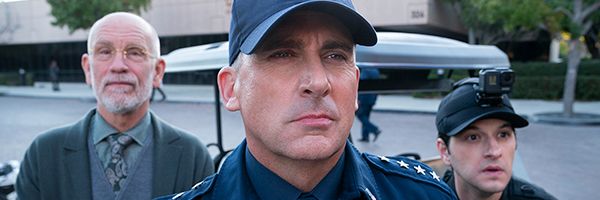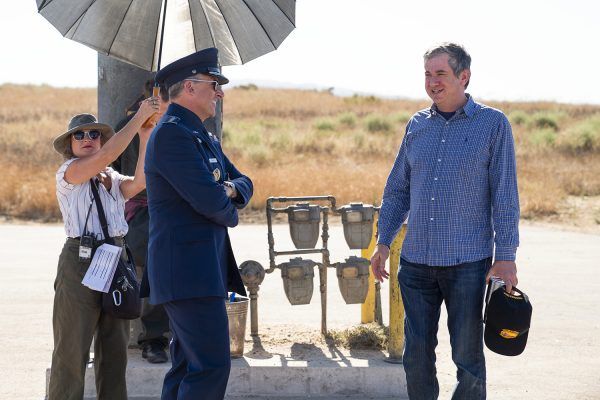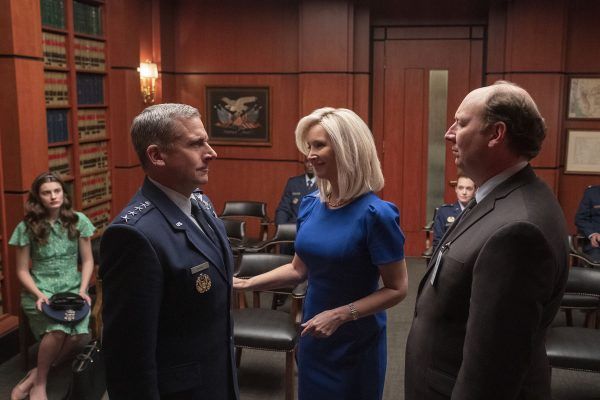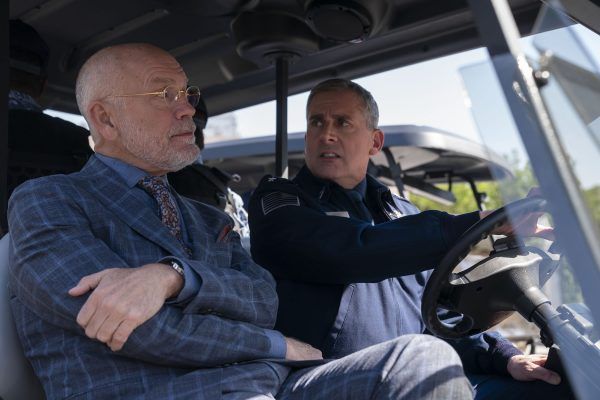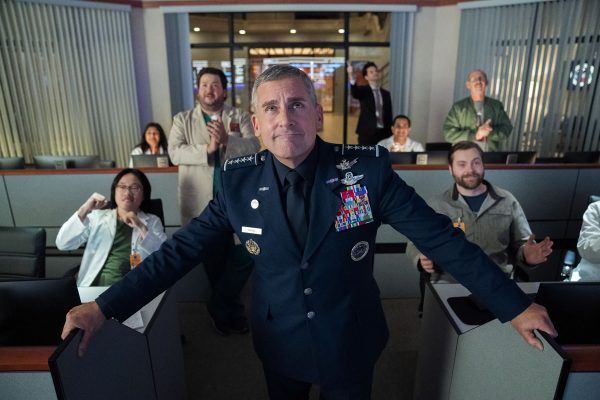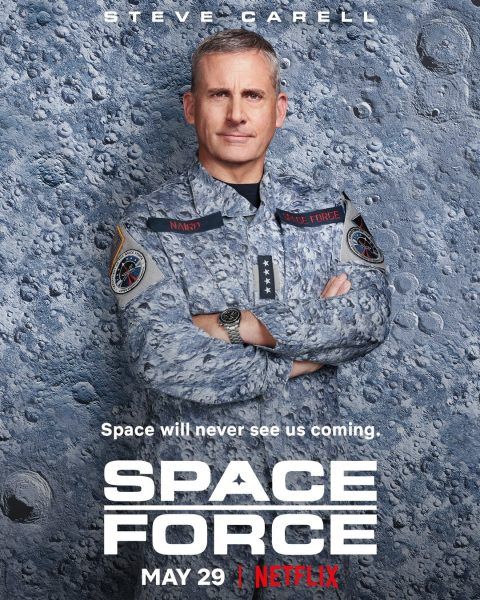In January 2019, Netflix dropped a teaser trailer for a new workplace comedy series called Space Force created by Greg Daniels and Steve Carell, and starring Carell. But at the time that teaser dropped, Daniels and Carell didn’t even have a script for the show. It was literally just the idea of doing a comedy series about the people tasked with creating Space Force, inspired by Donald Trump’s real-life creation of this new military branch. But of course when you have someone like Daniels, whose TV credits range from King of the Hill to creating the U.S. version of The Office to co-creating Parks and Recreation, working in tandem with a comedy genius like Carell, it should come as no surprise that they were able to flesh out a compelling, surprising, and funny series in the ensuing months.
But Space Force is very much unlike anything Daniels has done before, and when I spoke to the showrunner as part of the press day for the Netflix series (which debuts on May 29th), he was clearly excited by the idea of trying something new. Daniels revealed how he and Carell set about fleshing this story out as a balance between a military point of view and the inspirational spirit of space exploration, and discussed how Stanley Kubrick’s masterpiece Dr. Strangelove inspired the show’s approach to real-world politics. Daniels also talked about doing justice to military values while also fleshing the cast out with incredibly funny performers, from Lisa Kudrow to Ben Schwartz, and how John Malkovich offered his services after seeing the announcement teaser trailer.
I was also curious to learn how Daniels internally gauged how well the show was working, since unlike The Office and Parks and Rec, Space Force would be completed before audiences would get a chance to see a single episode. We also talked about the series’ cinematic style in contrast to the mockumentary format of The Office, and if Daniels and Carell were thinking about Michael Scott at all while creating the character of General Mark Naird.
Check out our conversation below, and stay tuned to Collider later this week for more spoiler-y aspects of my interview with Daniels as well as additional interviews with the Space Force cast. The series premieres on Netflix on May 29th.
When it was first announced, I know Steve has said that Netflix called him and said, "What about Space Force?" And he said, "Great," and he called you and said, "Space Force," and you said, "I'm in." But I'm curious, what is the next step after that? Because there are so many different ways this show could go, how did you guys decide what the tone of this piece would be?
GREG DANIELS: Well, we saw the announcement video and the funniest thing about it, I think, was that there was a General off-camera who was being referenced as the guy who was going to take over. We immediately started to picture how difficult the mission would be for this General, because the mission was boots on the moon by 2024, which is incredibly audacious, and implausible frankly. It would require an enormous amount of scientific know-how, and creativity, and flexibility. In the context of a lot of pressure from politicians, and it just seemed like a hard job. In picturing what a task that was, we got together and we started pitching out what kind of person would be up for a task like that. We wanted to tell it from the point of view of the military, and put them as the character that you identify with.
We also wanted to do justice to both the good military values of integrity, and self-sacrifice, etc., as well as the inspirational aspects of going to outer space. Because, when you think about the Apollo missions, they were such a highlight of American history, and they were so inspirational for everybody around the world when Neil Armstrong took one small step for a man, one giant leap for mankind. It was really about doing it for all humans, and so there's this aspect of space exploration that's super optimistic, and patriotic, I think. We wanted to include that spirit in it as well, and still be a comedy. It's like it's a character comedy, and it's about the characters of these people with this really hard mission, and it's kind of a “laugh with” energy I would say.
I think it's impossible to completely dodge politics in a show like this. You guys lean into it with characters that bear resemblance to AOC, or Scaramucci. I'm curious how you guys approached the politics aspect of it. The president is not named in the show but is it specifically Trump? Is that where you guys were thinking, or do you want it to be just unsaid?
DANIELS: Like I said, it is a character comedy, and so we are trying to make it work for the longterm. We looked at Dr. Strangelove as an inspiration, and you think to yourself, "Okay, well, I'm at a distance now where I don't know which politicians are being made fun of in Dr. Strangelove." But I'm aware that a person of integrity in the military is going to have to negotiate with a lot of different people with different agendas. There's going to be politicians that just don't understand what's happening on the ground, and are just more concerned with appearances and politics. There's going to be scientists who are hard to understand, and brilliant, and arrogant, you know what I mean?
I think that when you tell a story that's about this fictional Space Force, people are going to read into it. The seams of it are pretty much contrasting the optimism of the Apollo missions with this more militaristic nationalistic version. Which is possibly saying something about the need for cooperation to solve a lot of these big problems that are affecting the entire world at the same time.
I think that's reflected in this really sweet dynamic between the characters played by Steve Carell and John Malkovich, who are incredible. The cast is phenomenal, but you have these two characters at the center of it who may be at opposite ends of the political spectrum, but are also unlikely friends. I was curious how that dynamic evolved, was that always what it was on the page? And how did bringing in John Malkovich to play opposite Steve change that, maybe?
DANIELS: Well, I mean, we were very lucky to get John Malkovich. What happened was Netflix announced the show before we had a script, which was a little bit nerve-racking. But the thing about it was that John Malkovich's agent called and said, "Hey, Malkovich saw the announcement, and he would love to be a part of it." So we were able to write the character with him in mind from the beginning, which is a great benefit.
Wow.
DANIELS: So, it's really cool to have an actor of his stature for Steve to play off of. As we were working on it in the first episode, I remember being on set and having this insight that their relationship is a little bit of a blue state, red state relationship. When you think of it that way you go, "Oh, that's cool," that maybe if they can be friends, there's hope for the rest of us.
Both The Office and Parks and Rec, which are two of the best TV shows ever made, made adjustments going into each show's second season based on audience reaction. And while streaming TV allows you to more creative freedom, and probably a bigger budget, I was wondering if you missed that live feedback aspect of network TV? And how you just internally and personally gauge how well it's working, and what adjustments might need to be made once you start shooting?
DANIELS: Yeah, that's a very smart observation. We didn't have a pilot on Parks and Recreation. We went straight to series, so we saw the first cut while we were shooting Episode 3, so we started to make adjustments already. But it didn't really hit until Season 2, the big adjustment, I think, which was that Amy Poehler was funnier being the smart center of a crazy world than somebody whose character flaws caused their own problems. I would say by three or four episodes, we had fixed that I think, personally. With this you don't necessarily have that ability, but what you do have is you have a long post-production process, and you hand over all the episodes after everything has been shot. So you can go back and realize, "Oh, now I see how the last episode worked out. I'm going to go back and adjust the cut of the first episode." So there is a little bit more of an ability to make it one coherent artistic work when it's 10 episodes, and you finished shooting, and then you get into the editing room.
That’s interesting. Well, another thing that I found really striking about the show is just the aesthetic. It very cinematic, and you've got Paul King and Dee Rees directing, and you even got Carter Burwell to do the score.
DANIELS: Yeah, and it's a full orchestra too!
It's fantastic, it's so good. I thought it sounded familiar, and I looked it up, and I was like, "Oh, of course it's Carter Burwell." But I was curious what discussions went into how the show would look? Because it certainly looks different than any other show you've made thus far.
DANIELS: Yes, well I use the same cinematographer that I used on Upload. Simon Chapman.
Yeah, I noticed that.
DANIELS: Yeah, so for me personally, you don't want to ever repeat yourself, and the theme of Space Force is very grand. It's starting an entire new branch of the military, it's going into outer space, it's got this Washington setting, and the branch has huge projects with giant budgets and everything. So you really have to conceive of it at a big scope, I think. That meant certain types of cinematography, it meant a certain kind of music. We were like a comedy Ron Howard Apollo 13 feel to it, and it was very exciting to get to work with all those people, and to have those resources. The last time I had a full orchestra was when I was working on The Simpsons.
Obviously it looks different, and Steve Carell is playing a very different character from The Office. But comparisons to The Office were going to be a little bit inevitable in that it's a workplace comedy, and it's you and Steve, there're even familiar faces on the writing staff. I was curious how you guys found the character of Naird, and how conscious you were about making him very different from Michael Scott?
DANIELS: Well, I mean, he's so different from Michael Scott. He's almost an opposite, I would say, of Michael Scott. Michael is such an incompetent and terrible leader, and a person who can be persuaded out of his opinion in two seconds. Mark Naird is all about being a great leader and a person of integrity, and if he has the character flaw it's inflexibility, they're really quite opposite. I feel like Mark’s narrative is a little bit closer to Hank Hill, if you want to look at somebody who I've written for before. Again the show was announced before there was anything to look at, and so I feel like it'll be cleared up the moment that people start watching it. But at the moment, I think people think it's a mockumentary set on a spaceship, you know what I mean?
Yeah.
DANIELS: And it just really couldn't be further from that.
Yeah, well, and I think that goes to the aesthetic of it as well. It's just so different from that mockumentary format, I think it's immediately like, "Oh, this is something very different."
DANIELS: Yeah, but I think that once you even look at the trailer you figure it out.
On Parks and Rec and The Office, obviously you cast a bunch of unfamiliar faces. And the same with Upload, which is a show that I absolutely loved. In this show you've got Ben Schwartz, John Malkovich, Jane Lynch, Jimmy O. Yang. It's kind of a murderer's row. Again, I shouldn't have been surprised by the time I got to the end of the season, all of these characters are so fleshed out, and so interesting. I was just wondering how you approach the evolution of characters as the season progresses? Is it something you have in mind, or is it conversations with the actors as you're shooting, or as you're writing?
DANIELS: Yeah, well it's pretty much the same process. You talk to the actors, you try and get to know who they are as people, you try to involve some of their own traits in their own backstories. I think it's what the actors do, because the actors are given a character and then part of the actor's job is to go into their own experience and figure out how they can relate to the character. So you try and help them with that, and be part of that process to flesh them out, and make them feel like real three dimensional people. So that part of the process is very similar, but with Space Force, Steve is like coming into it as a world famous comedy star. Part of it is you want to... like with the joint Chiefs of Staff, you want to find people that are going to have the same presence that he brings to the thing. Because they have to be able to jostle him, and beat up on him a bit, you know what I mean? We were so lucky to be able to assemble all these people where you just look at them, you go, "God, I love that guy. I love her." It just helps to be able to feel like he's surrounded by his peers.
Well, thank you so much for your time and congrats again on this show. I'm a huge fan of Upload as well, and I'm just very happy to have two Greg Daniels shows back on the air.
DANIELS: Oh, that's so sweet of you. Thank you very much, take care of yourself.
Space Force premieres on Netflix on May 29th.

